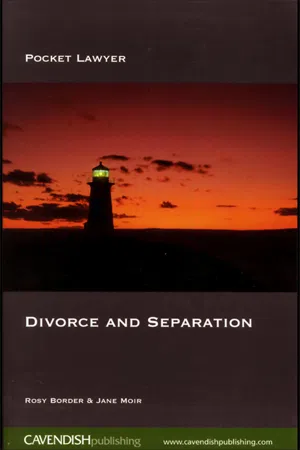
- 216 pages
- English
- ePUB (mobile friendly)
- Available on iOS & Android
Divorce and Separation
About this book
The Pocket Lawyer series is designed for members of the public who want 'how to' guidance in situations that would normally require expert advice.
Each title:
- is written by experts in their field
- contains all the information you need in one book
- has an accessible and user-friendly layout and structure
- is supported by a companion website providing free updates and ready-to-use documents and letters.
This book enables you to explore the options available to you when a marriage breaks down. It gives you all the information and paperwork you need, from conciliation and meditation through to separation and divorce. It provides the agreements and forms required for a mutually agreeable separation or a simple, uncontested DIY divorce. If you need to find a lawyer, Divorce and Separation will help you find one. It will also help when children are involved, offering advice on breaking the news to them and making arrangements for them.
Tools to learn more effectively

Saving Books

Keyword Search

Annotating Text

Listen to it instead
Information
1
Can we work it out?
A troubled marriage
- conciliation and counselling;
- separation; or
- divorce.
- your children;
- your finances;
- your home.
IT NEEDN’T BE ANYBODY’S FAULT!
Talking it over
Conciliation and counselling
- Relate (see ‘Useful contacts’ and your local telephone directory);
- local organisations (such as, in Suffolk, PACT (Parents’ Conciliation Trust)) that specialise in looking after the needs of the children (check with your local Citizens Advice Bureau (CAB) for details of similar organisations in your area);
- some doctors’ surgeries which can refer patients to independent counsellors – ask your doctor what is available locally; or
- look on notice boards in your public library, call the CAB to find out what is available locally, and check out ‘Useful contacts’.
Mediation
Mediation is not the same as counselling
- arrangements for your children;
- dividing up your property;
- financial details;
When is mediation not the answer?
- When someone is less than frank and honest. For mediation to work successfully, both spouses must be frank with each other.
- When someone feels unsafe or intimidated. Neither spouse should feel threatened or pressurised by the other.
- When the dispute is something you cannot be expected to resolve for yourselves.
- if either of you lacks the mental capacity to take part in mediation;
- where there is violent behaviour on the part of one (or both) of you;
- where emergency proceedings have to be taken, such as child protection issues or violence within the family;
- where there is a court order banning one spouse from having contact with the other;
- in financial disputes where either of you is bankrupt;
- in certain matters where only the court can decide, such as in cases involving the paternity of a child;
- where marital therapy or counselling would be more helpful.
- it helps you to find a solution which both spouses feel is fair. There will not be any winner or loser. Instead, mediation is intended to help you to reach sensible, practical arrangements;
- it can help to reduce animosity and misunderstandings between the two spouses;
- it improves communication between spouses, which is particularly important if you have children.
2
Is separation an option
for you?
Reasons for separating
- you are miserable together;
- you want time out in the hope of saving your marriage;
- someone is at risk if you stay together (if this is you, turn at once to Chapter 8);
- you have decided that you may want a divorce on the grounds of separation (see below) rather than for one of the other reasons, or, as the court calls them, ‘facts’.
‘Facts’ for divorce
Table of contents
- Cover Page
- Title Page
- Copyright Page
- Disclaimer
- Welcome
- Buzzwords
- Frequently Asked Questions (FAQs)
- 1: Can We Work It Out?
- 2: Is Separation an Option for You?
- What Should a Separation Agreement Cover?
- 4: Separation and Children
- 5: Your Separation Questionnaire
- 6: Draft Separation Agreement
- 7: You and Your Solicitor
- 8: Emergencies: Domestic Violence
- 9: Emergencies: Going to Court
- 10: Legal Help and Public Funding
- 11: Divorce: How Do I Get One?
- 12: Filling in the Petition
- 13: Filling in the Statement of Arrangements for Children
- 14: If You Are the Respondent
- 15: The Next Stages
- 16: Dividing the Spoils
- 17: The Family Home: Safeguarding Your Rights
- 18: Managing Stress
- 19: Children
- 20: Some Real Life ‘Behaviour ’ Particulars
- Useful Forms
- Sample Letters
- Useful Contacts
- Notes
Frequently asked questions
- Essential is ideal for learners and professionals who enjoy exploring a wide range of subjects. Access the Essential Library with 800,000+ trusted titles and best-sellers across business, personal growth, and the humanities. Includes unlimited reading time and Standard Read Aloud voice.
- Complete: Perfect for advanced learners and researchers needing full, unrestricted access. Unlock 1.4M+ books across hundreds of subjects, including academic and specialized titles. The Complete Plan also includes advanced features like Premium Read Aloud and Research Assistant.
Please note we cannot support devices running on iOS 13 and Android 7 or earlier. Learn more about using the app